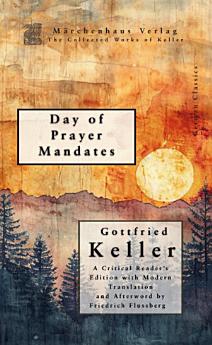Day of Prayer Mandates
May 2024 · Marchen Press
Ebook
50
Pages
family_home
Eligible
info
reportRatings and reviews aren’t verified Learn More
About this ebook
Among Keller's various official duties as the State Chancellery at the Zürcherische Freitagszeitung was the drafting of the "Bettagsmandate" (day of prayer mandates). The first of these documents was created in 1862. The government had reservations about publishing it. Keller, who himself abstained from religious ceremonies, had initially wished for well-attended church services for the Day of Prayer, but added, "However, let even the citizen who is not of a religious disposition not spend this day in restless diversion using his freedom of conscience, but demonstrate his respect for the fatherland in quiet contemplation." Many clergymen would have found it burdensome to read these words of a Feuerbachian from the pulpit, leading the government to order a more diplomatically formulated mandate from another writer. The Day of Prayer Mandates were a series of official mandates addressed to the citizens of a Swiss canton on the occasion of the national day of thanksgiving, repentance, and prayer. Traditionally read from the pulpit and published, these mandates serve as a call to introspection, moral accountability, and communal reflection on the state of the nation and individual responsibilities. In the 1862 mandate, Keller emphasizes the importance of this day not as a mere religious formality, but as a profound moment for citizens to evaluate their inner moral values and their contributions to the common good. The mandate reflects on the nation's recent progress and honors, cautions against complacency, and urges continued serious efforts in public and private life. Citizens are encouraged to reflect on their responsibilities to the fatherland and to ensure that their actions are consistent with the principles of justice, charity, and civic duty. In addition, the mandates address contemporary issues, including the extension of rights to the Jewish population within the canton, highlighting a step towards equality and social harmony. The document also touches on the broader geopolitical context, noting the ongoing American Civil War and its implications. This modern critical reader's translation from the original German includes supplementary materials that bring Keller's life and impact to life. Nietzsche considered Keller to be one of the greatest living poets of his time. However, his works are rarely found in other languages, so most people today are unaware of who he was or why he was important. This edition remedies that situation by providing a clear, accessible version of Keller's original German writing and offering insight into his broader ideas and the philosophical landscape in which he operated. Working directly from Keller's manuscripts, this new translation delivers literary excellence and scholarly depth with amplifying materials. Readers will discover not only Keller's powerful voice but also the philosophical currents that shaped an entire era of German thought. The edition includes an illuminating afterword tracing Keller's intellectual relationship with Nietzsche, revealing the fascinating dialogue between two of the period's most influential minds. A comprehensive timeline connects the major events of Keller's life with his published works, and a detailed index provides an authoritative guide to his complete writings. Together, these materials provide newcomers and serious readers with everything needed to appreciate one of literature's most overlooked figures.
About the author
One of Nietzsche's favorite living poets (the only real Swiss poet in his opinion, Keller was a major Swiss poet and writer, Keller is best known for his novel "Green Henry" (German: "Der grüne Heinrich"). His work is representative of the Realist movement, which sought to depict life and society as they were. Keller's stories often reflect the conflict between individual creative drives and the constraints of society. His novel "The People of Seldwyla" was one of Nietzsche's favorite.
Rate this ebook
Tell us what you think.
Reading information
Smartphones and tablets
Install the Google Play Books app for Android and iPad/iPhone. It syncs automatically with your account and allows you to read online or offline wherever you are.
Laptops and computers
You can listen to audiobooks purchased on Google Play using your computer's web browser.
eReaders and other devices
To read on e-ink devices like Kobo eReaders, you'll need to download a file and transfer it to your device. Follow the detailed Help Center instructions to transfer the files to supported eReaders.







